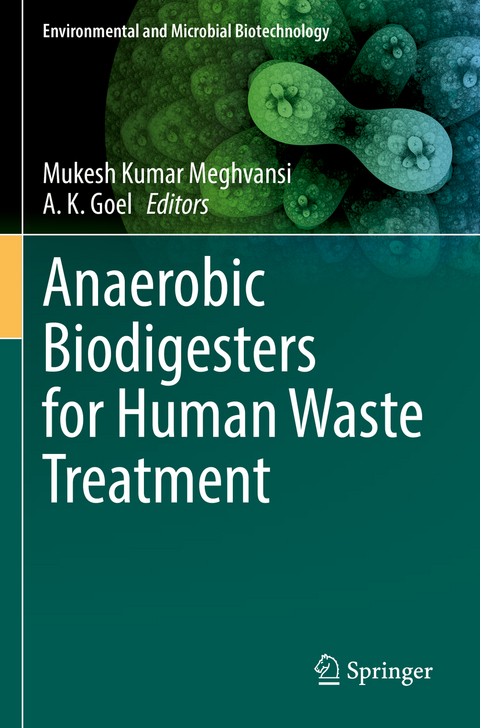
Anaerobic Biodigesters for Human Waste Treatment
Springer Verlag, Singapore
978-981-19-4923-4 (ISBN)
The anaerobic biodigestion is a process of break-down of organic waste by anaerobic microorganisms in absence of the oxygen. This process has been conventionally used for treating various types of organic waste including sewage sludge. After optimizing various process parameters, researchers have developed anaerobic biodigesters that have been successfully used for human waste (nigh soil) treatment. The topic of human waste treatment assumes global significance in the wake ofUN sustainable Development Goals (SDG) wherein SDG-6 specifically highlights the Sanitation for all by 2030. The anaerobic Biodigester technology has the potential to manage the human waste as well and can contribute immensely in achieving targets of UN-SDG-6. This book is of interest to researchers, academicians, scientists, policy officials and capacity builders. Also the book serves as additional reading material for undergraduate and graduate students of environmental Biotechnology. National and international biotechnologists, environmental engineers and sanitation experts also find this to be a useful read.
Dr. Mukesh Kumar Meghvansi received his PhD from Maharshi Dayanand Saraswati University, Ajmer (India) while working on a multinational research project sponsored by the European Commission. For a stint, he served as lecturer at Bundelkhand University Jhansi (India) and then joined Defence Research & Development Organisation (DRDO, India) in 2008 as a scientist. Since his joining, he is engaged in R & D on organic waste management. He has to his credit sixty publications in various international and national journals/books. He has filed three patents, one design and one trademark in India. He is life member of Biotech Research Society India, Indian Botanical Society and, annual member of several national/international professional bodies/societies. He is reviewer of many national international journals. He has authored/edited five books including two with Springer Nature, Switzerland. He also holds an MBA degree with specialization in project management. He is the recipient of DRDO Science Day Oration Award. Currently, he is working as Scientist 'E' at Bioprocess Technology Division, Defence Research & Development Establishment, Gwalior (India). His current research area includes anaerobic biodegradation of human waste (night soil). He has been instrumental in design and development of floating biodigester for Dal lake-houseboats and its inland variant for individual household use in Srinagar (UT of J&K, India) for the purpose of human waste treatment. Dr. Ajay Kumar Goel, received his PhD (Microbiology) from CCS Haryana Agricultural University, Hisar (India) in 1999. As a prolific researcher in the field of microbial biotechnology, he has been recipient of several national awards including AMI-Young Scientist Award, DST (Department of Science & Technology, Govt of India)- Young Scientist Research Fellowship, DRDO-Laboratory Scientist of the Year Award, DRDO Young Scientist Award, DBT (Department of Biotechnology, Govt of India)-Overseas Associate Fellowship, DRDO Technology Group Award, DRDO Science Day Oration Award, and DRDO Technology Day Oration Award. He has more than 100 research papers, 10 patents, radio talks and several oversea presentations to his credit. He is currently working as Scientist ‘F’ & Head, Bioprocess Technology Division, Defence Research & Development Establishment, Gwalior (India). Currently, he is leading a research group as a Project Director that is working on development of high performance biodigester for human waste treatment.
Chapter 1. Sewage Treatment Through Anaerobic Processes: Performance, Technologies and Future Developments.- Chapter 2. The Chemistry of Human Excreta Relevant to Biogas Production– A Review.- Chapter 3. Mathematical Modeling for Understanding and Improving the Anaerobic Digestion Process Efficiency.- Chapter 4. The Current Energy Panorama and the Production of Biogas from Sewage Sludge.- Chapter 5. Anaerobic Biodigesters for Treatment of High-strength Wastewater.- Chapter 6. Microbial Community Dynamics in Anaerobic Digester Treating Human Waste: A Review.- Chapter 7. Recent Trends in Performance Assessment of Anaerobic Biodigester for Sewage Waste Management: A critical Review.- Chapter 8. Decentralized Anaerobic Digestion Technology For Improved Management of Human Excreta in Nigeria.- Chapter 9. Performance Enhancement Strategies of Anaerobic Digestion Technology: A Critical Assessment.- Chapter 10. Sewage Sludge Pretreatment Strategies for Methane Recovery and Sanitization.- Chapter 11. Towards a Circular Economy of Sewage Sludge Anaerobic Digestion: Relevance of Pre-treatment Processes and Micropollutants Presence for Sustainable Management.- Chapter 12. Inoculum Optimization Strategies for Improving Performance of Anaerobic Biodigester: Current Trends and Future Perspectives.- Chapter 13. Efficient Biogas Production Through Syntrophic Microbial Partnerships in the Presence of Conductive Materials in Anaerobic Digesters Treating Organic Waste Streams: A Critical Assessment.- Chapter 14. Application of Anaerobic Digestion in Decentralized Faecal Sludge Treatment Plants.
| Erscheinungsdatum | 24.08.2023 |
|---|---|
| Reihe/Serie | Environmental and Microbial Biotechnology |
| Zusatzinfo | 29 Illustrations, color; 1 Illustrations, black and white; X, 281 p. 30 illus., 29 illus. in color. |
| Verlagsort | Singapore |
| Sprache | englisch |
| Maße | 155 x 235 mm |
| Themenwelt | Naturwissenschaften ► Biologie ► Genetik / Molekularbiologie |
| Naturwissenschaften ► Biologie ► Mikrobiologie / Immunologie | |
| Naturwissenschaften ► Biologie ► Ökologie / Naturschutz | |
| Schlagworte | Anaerobic Biodigester • biodegradation • human waste • Methanogens • sewage sludge |
| ISBN-10 | 981-19-4923-9 / 9811949239 |
| ISBN-13 | 978-981-19-4923-4 / 9789811949234 |
| Zustand | Neuware |
| Informationen gemäß Produktsicherheitsverordnung (GPSR) | |
| Haben Sie eine Frage zum Produkt? |
aus dem Bereich


